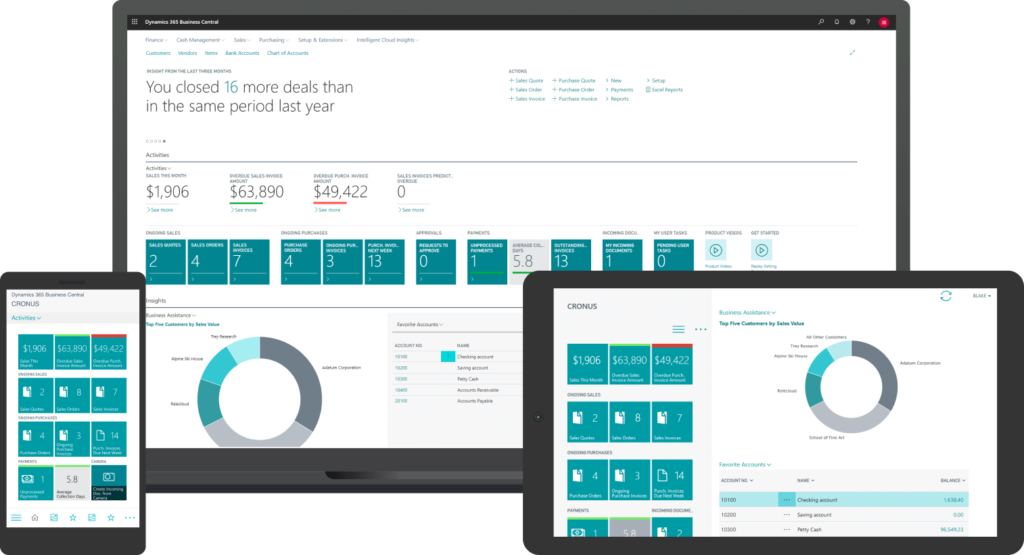What makes Dynamics Business Central the top pick for Accountants?
Businesses can experience greater possibilities by upgrading from basic accounting software to Microsoft Accounting Software.
Accounting software has become an indispensable tool for accountants across organizations, streamlining and optimizing various accounting processes. From small businesses to multinational corporations, accountants rely on these software solutions such as QuickBooks, Xero, and Sage to manage financial data efficiently.
As small businesses expand, their requirements become more complex. Basic accounting software may no longer suffice; instead, they may require additional functionalities to meet new demands such as legal compliance, inventory and supply chain management, project billing, and warehousing.
To accommodate these evolving needs, businesses seek a scalable solution that integrates seamlessly with existing systems, handles diverse processes efficiently, and provides comprehensive reporting capabilities. This is precisely where Microsoft Accounting software Business Central steps in.
Challenges In basic Accounting Software
Rising expense for renewals
Disregarding the substantial upfront expenses associated with software, there are also ongoing costs for maintenance and upgrades with numerous on-premises hardware and software solutions. This can pose significant challenges for businesses, hindering their ability to effectively manage and expand.
Ambiguous implementation expenses
Transitioning to a new finance or ERP system entails inherent risks. During implementation, costs and timelines often fluctuate and are frequently underestimated. Consequently, this may lead to delays in go-live schedules, customers encountering supplementary charges from suppliers to finalize the project, and potential revenue setbacks due to incomplete functionality and processes.
Accounting and Reporting
Employing multiple databases to oversee accounts across multiple companies can be extremely cumbersome, particularly when it comes to sharing and consolidating financial data, needlessly prolonging the process. Not only is this approach time-consuming, but it also results in a lack of visibility into companywide accounts and live data, potentially leading to uninformed or delayed decision-making.
Project Management Control
For companies managing projects and invoicing for services, tracking billable time and incremental hours can become exceedingly challenging when relying on multiple spreadsheets and external databases. This often leads to confusion and errors, resulting in late invoicing for customers, inaccurate billing for projects, and an overall decline in revenue.
Billing and Subscription Management
Manually calculating contract and subscription billing through spreadsheets and isolated databases can be a significant hassle, particularly when factoring in individual customer pricing. Maintaining billing accuracy becomes challenging and frequently results in heightened invoicing errors and customer grievances.
Lack of Integration
Effectively collaborating with other departments in a business that relies on multiple databases poses a real challenge. The absence of integration across departments hampers visibility and information sharing, leading to uninformed decisions and hindering overall business productivity.
Discover essential features that make Business Central the top pick for distribution accounting in any business

Automation
Business Central revolutionizes accounting by automating the entire process, freeing up valuable time for businesses. It streamlines tasks such as reporting, eliminating the need for manual input and reducing the risk of errors. It can effortlessly generate complex financial reports, incorporating multiple data points for comprehensive insights.
Role center for Accountant
Business Central offers a dedicated role center specifically designed for accountants, ensuring they have access to the tools and information essential for their responsibilities. From this centralized dashboard, accountants can efficiently manage clients, track financial data, and gain real-time insights into cash flow.
Integration
Business Central broadens the scope of services you can provide by integrating seamlessly with a suite of Microsoft solutions. These include Dynamics 365, Microsoft 365, and Power BI, creating a cohesive ecosystem that enhances productivity and collaboration. By leveraging these interconnected tools, businesses can streamline operations, access valuable insights, and improve decision-making processes.
Customization
Business Central stands out for its remarkable customization capabilities, empowering accountants to tailor the software to meet their specific requirements with ease. Accountants can customize workflows, reports, and dashboards to align with their unique business processes and preferences.
Security
Business Central prioritizes security, offering robust measures to safeguard sensitive financial data. With built-in security features and flexible role design, the software establishes a secure framework for sharing financial reporting and metrics with specific audiences. By assigning user roles and permissions, businesses can control access to sensitive information, ensuring that only authorized individuals can view or modify financial data.
Conclusion
When using basic accounting software, managing each accounting role separately can be time-consuming and cumbersome. However, with Business Central, this process is streamlined, offering a comprehensive overview that eliminates the need to handle each role separately. By centralizing accounting functions within a single platform, Business Central provides businesses with a holistic view of their financial operations.
This means that instead of juggling multiple tasks across different roles, users can access all relevant information and perform necessary actions from one unified interface. This not only simplifies the accounting process but also enhances efficiency, allowing businesses to focus their time and resources on strategic initiatives rather than administrative tasks.
Yes, Microsoft Dynamics 365 Business Central is indeed an accounting software, but it’s more than just that. It’s a comprehensive business management solution designed for small and medium-sized enterprises (SMEs). While it includes robust accounting features like general ledger, accounts receivable, accounts payable, and financial reporting, it also offers functionalities for inventory management, supply chain management, sales, purchasing, project management, and more. It’s essentially an all-in-one solution to streamline various aspects of business operations.
Microsoft Dynamics 365 Business Central is generally considered a strong ERP (Enterprise Resource Planning) system, especially for small and medium-sized businesses (SMEs). Its integration with other Microsoft products like Office 365 and its cloud-based architecture are notable advantages.
Accounting software is a type of application software designed to streamline and automate accounting and financial tasks within an organization. It helps businesses manage their financial transactions, track expenses and revenues, generate financial reports, and facilitate compliance with accounting standards and regulations.
Microsoft Dynamics 365 Business Central is used for accounting.
ERP system.
Billing and invoicing system.
Payroll management system.
